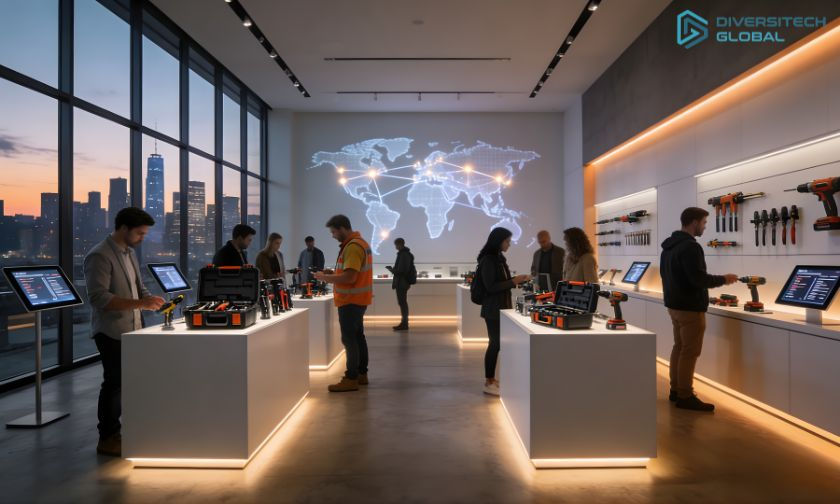Private Label Brands and Retailers Team Up Through Collaboration
- Diversitech Global

- Feb 8, 2024
- 5 min read
Updated: Feb 20, 2024

In the dynamic landscape of retail, a strategic symbiosis has emerged between private label brands and retailers, catalyzing a new era of collaborative innovation and market dominance. The convergence of these formidable entities has ushered in a paradigm shift, characterized by synergistic partnerships, bespoke product offerings, and amplified customer loyalty. This article delves into the multifaceted dimensions of this collaborative ethos, unraveling the intricacies of private label-retailer alliances, their impact on consumer preferences, and the consequential implications for the DIY tool hardware industry.
Table of Contents:
The Rise of Private Label Brands in Retail
The burgeoning ascendancy of private label brands within the retail realm epitomizes a seismic transformation in consumer preferences and purchasing behavior. Private labels, also known as store brands, encompass products manufactured or sourced exclusively for a specific retailer, embodying an unequivocal testament to retail differentiation and brand exclusivity. Their meteoric rise is underpinned by several compelling factors:
Economic Viability: Private label brands present an economically viable avenue for retailers to curate distinctive product lines, circumventing reliance on traditional wholesale channels and engendering higher profit margins.
Brand Customization: Retailers leverage private label partnerships to tailor product attributes, design, and pricing to align with their unique brand identity, resonating with discerning consumer segments seeking exclusivity and value.
The proliferation of private label brands underscores a fundamental shift in consumer predilections, gravitating toward personalized, premium-quality offerings that deftly encapsulate the retailer's ethos.
Collaborative Product Development and Customization
The strategic alignment between private label brands and retailers engenders an unprecedented milieu of collaborative product development and customization, heralding a new epoch of bespoke offerings tailored to meet evolving consumer demands. This collaborative synergy manifests through:
Tailored Product Attributes: Retailers collaborate with private label manufacturers to engineer products that impeccably harmonize with specific consumer preferences, encompassing design aesthetics, functionality, and material composition.
Exclusive Brand Differentiation: By co-creating proprietary products, retailers fortify their brand differentiation, amplifying their competitive advantage and fostering unwavering customer loyalty grounded in exclusivity and exceptional value propositions.
For instance, a leading home improvement retailer may collaborate with a private label manufacturer to develop a line of premium-grade DIY power tools designed to cater to professional craftsmen, thereby elevating the retailer's stature as a destination of choice for high-performance tool hardware.
Amplified Market Penetration and Shelf Dominance
The confluence of private label and retail entities precipitates an unparalleled surge in market penetration and shelf dominance, catalyzing a transformative redefinition of retail space utilization and consumer engagement. This phenomenon is underscored by:
Enhanced Shelf Visibility: Private label products, meticulously integrated with retail assortments, command heightened shelf visibility, effectively capturing consumer attention and fostering organic brand engagement.
Exclusivity in Assortment Curation: Retailers wield private label collaborations to cultivate exclusive, differentiated assortments, strategically positioning themselves as purveyors of unique, inimitable product selections that transcend conventional offerings.
As a case in point, a renowned hardware store chain may forge an alliance with a private label partner to curate an exclusive range of environmentally conscious, sustainably sourced hand tools, thus consolidating its position as a vanguard of eco-conscious retailing within the DIY hardware domain.
Augmented Consumer Loyalty and Brand Affinity
The amalgamation of private label and retail symbiosis engenders a palpable augmentation of consumer loyalty and brand affinity, accentuating the intrinsic allure of curated, bespoke products synonymous with the retailer's imprimatur. This symbiotic relationship is epitomized by:
Enduring Brand Allegiance: Collaborative private label products kindle enduring brand allegiance and patronage among consumers, fostering a sense of brand exclusivity and intrinsic association with the retailer's ethos.
Customer-Centric Innovation: Retailers leverage private label alliances to spearhead customer-centric innovations, identifying unmet consumer needs and engineering tailor-made solutions that resonate with the pulse of discerning clientele.
For example, a global manufacturing conglomerate, in partnership with a leading hardware retail chain, may introduce an innovative line of smart connected power tools imbued with advanced IoT capabilities, poised to captivate tech-savvy DIY enthusiasts and prosumers.
Ethical Sourcing and Sustainable Manufacturing Imperative
The strategic convergence of private label and retailer partnerships serves as a catalyst for advancing ethical sourcing imperatives and sustainable manufacturing practices, galvanizing a holistic commitment to environmental stewardship and corporate social responsibility. This pivotal focus area encompasses:
Ecologically Responsible Sourcing: Collaborative private label initiatives underscore a concerted emphasis on ecologically responsible sourcing, driving the procurement of sustainable raw materials and ethical supply chain practices.
Sustainability-Centric Innovation: Retailers, in tandem with private label partners, foster a culture of sustainability-centric innovation, spearheading the development of eco-friendly product iterations and packaging solutions that mitigate environmental impact and resonate with conscientious consumers.
In essence, a leading DIY tools retailer, in collaboration with private label manufacturers, may introduce an exclusive range of sustainably sourced, recyclable hand tool sets, thereby affirming its commitment to environmental stewardship and fortifying its appeal among environmentally conscious clientele.
Want to incorporate sustainability into your craft & art tool kits & double your sales? Get in touch
Dynamic Pricing Strategies and Margin Optimization
The strategic alliance between private label brands and retailers underpins a paradigm shift in pricing strategies and margin optimization, instigating a recalibration of retail dynamics and consumer value propositions. This transformative paradigm is characterized by:
Competitive Pricing Leverage: Private label collaborations empower retailers to wield competitive pricing leverage, steering clear of price wars while delivering exceptional value propositions predicated on quality and affordability.
Margin Enhancement: Retailers capitalize on private label partnerships to optimize profit margins and yield, bypassing intermediary markups and attaining greater control over pricing dynamics and cost efficiencies.
For instance, a prominent hardware store chain, through collaborative synergy with private label partners, may introduce a series of budget-friendly, high-quality tool accessory kits, positioning itself as a cost-effective destination without compromising on product integrity or customer satisfaction.
Adaptable Marketing Strategies and Brand Amplification
The symbiotic entente between private label entities and retailers furnishes an avenue for adaptable marketing strategies and brand amplification, fortifying the retailer's market positioning and augmenting its brand resonance. This strategic leverage encompasses:
Brand Amplification: Collaborative private label products serve as conduits for brand amplification, bolstering the retailer's brand equity and expanding its market footprint via differentiated, proprietary offerings.
Strategic Marketing Synergy: Retailers harness private label alliances to orchestrate strategic marketing synergy, engendering targeted promotional campaigns and omnichannel engagement initiatives that accentuate product uniqueness and value proposition.
For example, a renowned DIY tools retailer, in partnership with private label manufacturers, may orchestrate a multimedia marketing campaign spotlighting an exclusive line of ergonomically designed power hand tools, resonating with professional craftsmen and enthusiasts alike, thereby amplifying brand visibility and recall.
An Alliance between private label brands and retailers in the DIY tools industry
In conclusion, the symbiotic alliance between private label brands and retailers in the DIY tool hardware industry heralds a transformative epoch characterized by innovation, adaptability, and consumer-centricity. This collaborative synergy engenders a strategic recalibration of pricing dynamics, amplification of brand resonance, precision in demand forecasting, seamless omnichannel retail experiences, and a forward-looking trajectory marked by relentless innovation and global market expansion.
As the industry charts a course toward a future replete with latent opportunities, the collective potential of private label-retailer alliances is poised to fortify market competitiveness, drive consumer engagement, and foster sustained industry growth, thereby underscoring the profound impact of collaborative partnerships in shaping the future landscape of DIY tool hardware retail.
Related Article: Collaborative Initiatives with Retailers and Private Label Brands
Want to incorporate sustainability into your craft & art tool kits & double your sales? Get in touch




Comments